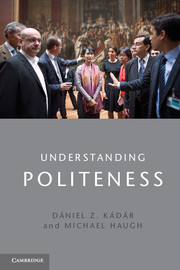1 - Introduction
Published online by Cambridge University Press: 05 June 2014
Summary
Why this book?
This book provides an overview of politeness. Politeness is a key means by which humans work out and maintain interpersonal relationships. Many of us have been educated how to behave politely since childhood; we only have to think about parents prescribing to their children when and how to apologise, to say ‘please’ and ‘thank you’ (at least in English), or to call (jiao) people by familial titles when greeting them (at least in Chinese). However, politeness is not limited to conventional acts of linguistic etiquette like formal apologies, so-called ‘polite’ language and address terms, although it includes all of these acts. Rather, it covers something much broader, encompassing all types of interpersonal behaviour through which we take into account the feelings of others as to how they think they should be treated in working out and maintaining our sense of personhood as well as our interpersonal relationships with others.
However, while this book relies on this broad definition of politeness, in accordance with its title Understanding Politeness we propose that there are in fact often multiple different understandings of politeness at play in discourse. Various different disciplinary and theoretical perspectives are necessitated, in turn, in order to tease out these multiple understandings of politeness. In this book we suggest that these various understandings offer different insights, which may at times be complementary, and so instead of singling out any one of these understandings, we aim to introduce a variety of them, with the aim of helping readers to make their way into this fascinating area. Our aim, then, is to discuss these different understandings of politeness in a systematic and organised way, with our aim being to point out interconnections between various views on and perceptions of politeness.
- Type
- Chapter
- Information
- Understanding Politeness , pp. 1 - 10Publisher: Cambridge University PressPrint publication year: 2013



